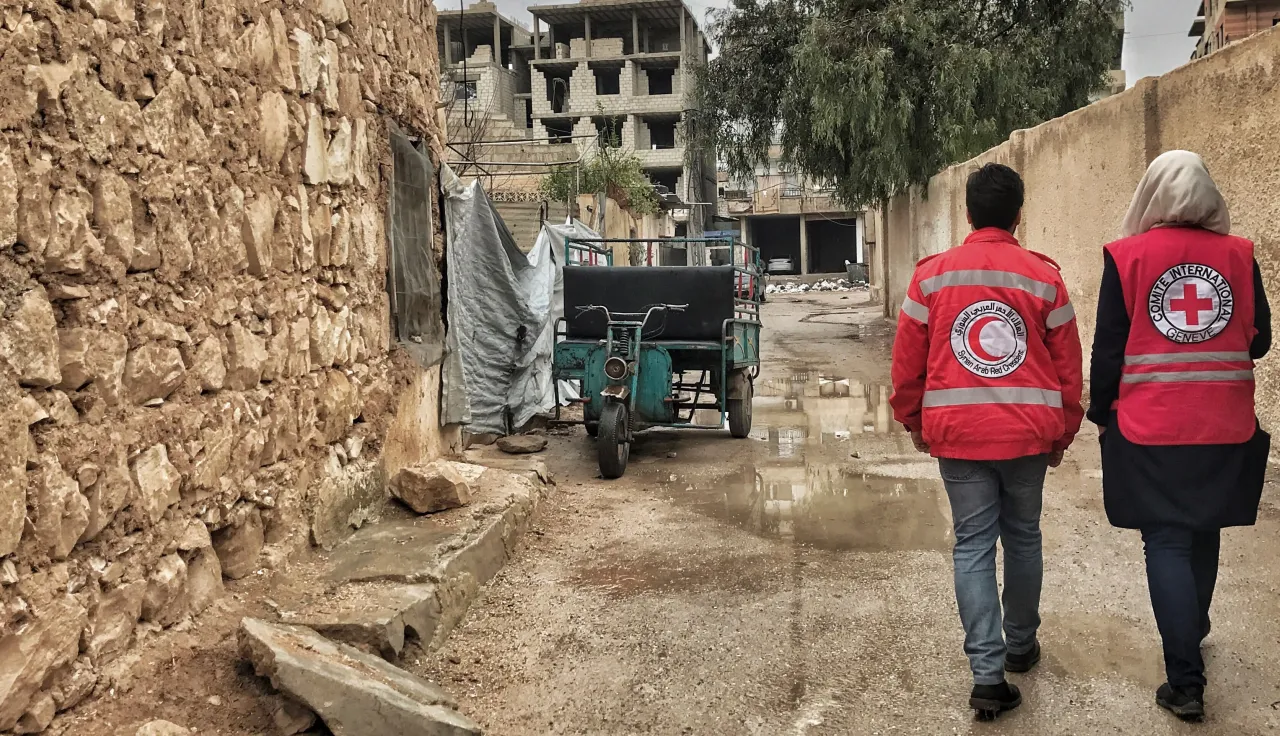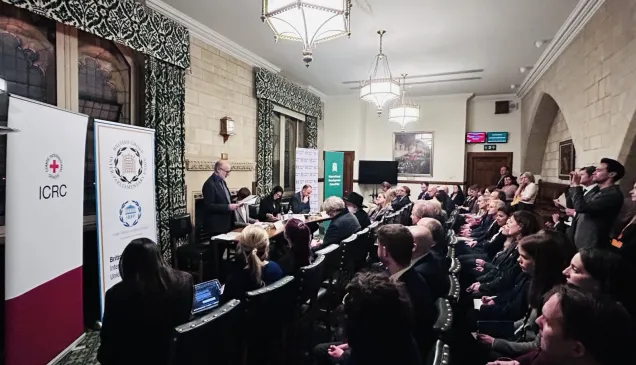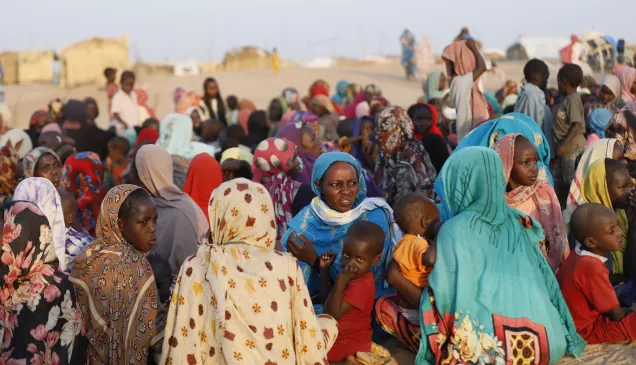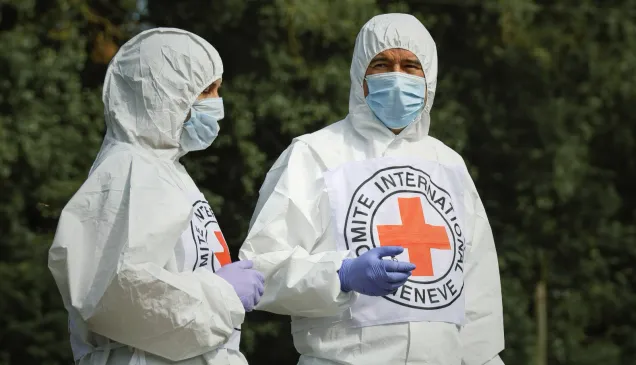The year ahead – ICRC’s 2022 priorities in the UK and Ireland

If the last two years have taught us anything it’s that the world does not stand still, even for a global pandemic.
Conflicts are inflicting human suffering on a vast scale; new technology is developing faster than ever before; defence and security partnerships are in the ascendency; climate change threatens human existence as we know it.
Yet amid the humanitarian warnings and crises there are opportunities to do things better. This is what underpins our priorities for the year ahead.
Record appeal
The ICRC’s 2022 appeal is our largest ever – £1.9bn (CHF 2.4bn) – reflecting the ever-growing humanitarian need we are witnessing.
Syria, Afghanistan and Yemen represent our biggest operations, in terms of budget. Ethiopia now features in the top 10, while Ukraine is another context that threatens to deteriorate.
We have launched our biggest ever #appeals: 2.4 billion Swiss francs to help meet humanitarian needs of people affected by armed conflicts & violence in 2022 - with #Syria, #Afghanistan & #Yemen top of the list. Sustained support is vital to help us make a difference. pic.twitter.com/I0VBpsCClt
— Robert Mardini (@RMardiniICRC) December 2, 2021
The UK and Irish governments are steadfast supporters of the ICRC, providing vital unearmarked funding to strengthen our life-saving work worldwide.
Unearmarked funding is essential. It allows us to react immediately and to prioritise our activities according to the humanitarian need. It is central to principled humanitarian action.
We will continue to work closely with UK and Irish authorities to make sure the voices of those we seek to help are heard.
Conflict and partnered warfare
In the last 20 years, human suffering from conflicts has surged, challenging our collective ability to address the myriad consequences.
War is never simple, but three interconnected trends have made matters even more complex:
- More conflicts, driven by more non-international armed conflicts
- More parties directly involved in conflicts
- More actors in the background, impacting conflicts via allies, partners and proxies
Partners and allies can make a positive contribution to the protection of civilians and others through their partnerships. Such relationships have the potential to help protect those not fighting.
We will work with decision-makers in London and Dublin to encourage them to use their influence directly and in support relationships to consider pragmatic ways to reduce the risk of harm to civilians and to enhance the protection of those not fighting.
Reducing the human cost of war is not only a humanitarian imperative: it can also shape the prospects for recovery and reconstruction.
As does providing closure to families on the fate of missing relatives even years after the conflict, which is the case for example in the Balkans and Georgia. These are key factors that contribute to long-term stability.
New technology, new threats, new opportunities
New technologies offer tremendous benefits for communities and individuals. Not to mention that they create new opportunities for humanitarians to deepen the scope and impact of their work.
However, the advantages also come with significant risks, particularly when it comes to handling sensitive data.
The ICRC has placed a great deal of emphasis on data security in recent years, knowing we are not immune from malicious action. And so it proved earlier this month when the ICRC was targeted by a sophisticated cyber-attack.
Cyber-attacks, misinformation/disinformation and data misuse all have real-world impacts in peaceful countries.
But in conflict zones, these issues become magnified for those already vulnerable. Data breaches and leaks involving personal data can have life-altering consequences.
Then there is the rapid development of autonomous weapons – they are not a work of science fiction from a distant dystopian future, but an immediate cause of humanitarian, legal and ethical concern. As is the weaponization of outer space.
The ICRC is working with the UK and Irish governments as well as global experts to find ways of managing the risks and leveraging opportunities related to new technologies in armed conflict and other situations of violence.
Counter terrorism and restrictive measures
Counter-terrorism measures, at home and overseas, are vital to ensure the security of people. These measures can, however, also have unintended humanitarian consequences.
The ICRC monitors these consequences and provides feedback on any concerns to UK and Irish authorities.
Linked to counter terrorism operations overseas are restrictive measures. Again, the ICRC does not question the legitimacy of international sanction regimes.
However, while it is not the intention, there is no doubt that restrictive measures can do significant harm to humanitarian operations and in-turn the people who need assistance and protection.
The way to deal with this is to provide for a humanitarian exemption, as the UN Security Council did for its Afghanistan sanctions at the end of 2021.
The ICRC will reinforce its engagement with UK and Irish authorities to carve out exemptions for neutral, impartial and independent humanitarian action in sanctions regimes of the UN, European Union and the UK’s new sanctions legislation.
The triple threat
Covid19, climate change and conflict – individually they are bad enough. When they collide, the ramifications are more severe.
As we made clear last year, communities in conflict zones are among the most vulnerable to climate change. We’ll continue to push their voices to the fore as we build-up to COP27 in Egypt.
Covid19 has not gone away and the rise of the Omicron variant is a reminder that we are not safe until we are all safe.
Together with the wider Red Cross Red Crescent Movement we will continue to advocate for greater vaccine equity.
Northern Ireland
For the last ten years we have been working with community-based organizations in Northern Ireland to ease sectarian tensions and to limit the use of violence within or between communities.
We support these organizations in their work to provide mediation services to people threatened with, or affected by, violence in their communities.
This year we will focus on supporting networking between a wide range of humanitarian negotiators in Northern Ireland and engaging with authorities to find ways to reduce the impact of violence on individuals and communities.
We will also continue to support the British Red Cross and Irish Red Cross in their work both individually and together in emergency and crisis situations.
Restoring family links
The ICRC, together with the Red Cross and Red Crescent societies around the world, is part of the Family Links Network.
This network provides tracing services for those who have been separated from their loved ones due to conflict, political upheaval, natural disaster, migration and other situations of violence.
In the UK and Ireland, the British Red Cross and Irish Red Cross take the lead on this important work and our delegation will continue to support them.
Helen Alderson is the head of the ICRC’s UK and Ireland regional delegation



